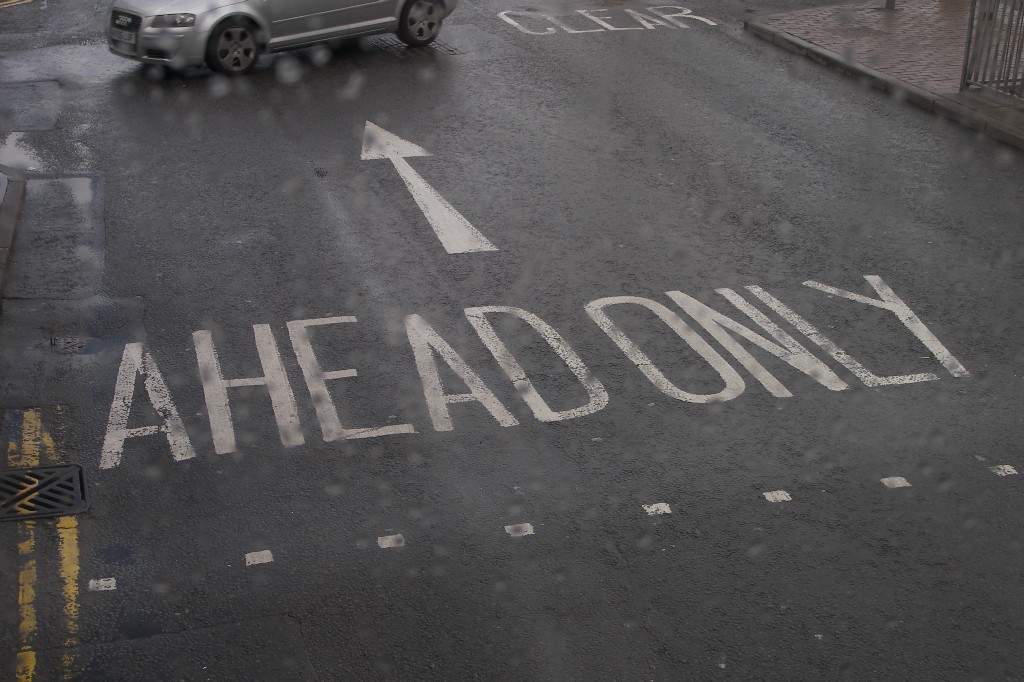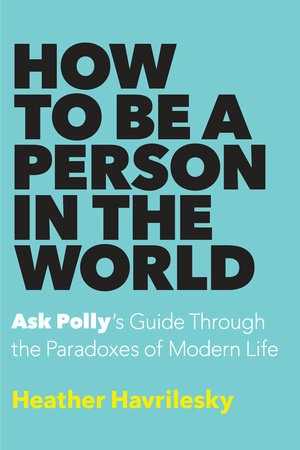How To Be An Advice Columnist
“Ask Polly” columnist Heather Havrilesky dispenses existential advice in a new book.

Does interviewing an advice columnist mean that you get to smuggle in questions about your own life? This is what I’m wondering as I drive to meet Heather Havrilesky. She writes “Ask Polly” for The Cut, and, in her weekly responses to letter-writers in various states of extremis, she consistently manages to be not merely helpful, but generous and bracing and witty. I just got married. I’m trying to make it as a freelance writer. My husband and I are about to move. Frankly, I could use some sage counsel.
I count it as a victory, then, that for almost two hours, over lunch at a Mexican restaurant just north of Los Angeles, I maintain a veneer of professionalism. Especially considering the fact that, in person, Heather Havrilesky is damn friendly. She presents as even-keeled: she’s a mom; she walks her dog; she seems genuinely interested in my answers to the questions she asks about my life. And yet she is also filled with an infectious, manic energy. She tells me about her musical ambitions, which were derailed in part because she wasn’t quite good enough at guitar to play the songs she’d written live, and in part because singing those same songs often made her cry. She demonstrates the facial expression (a kind of aw-shucks grimace) her husband makes when he’s about to tell her something he’s not sure she’ll like.
And so finally, I break. I need her advice, I tell her. With the iPhone I’ve been using to tape our conversation still recording on the table between us, I confess that I am spending too much time scrolling through Twitter and Instagram, coveting the clothes and social lives and careers of literary women who are roughly my age but impossibly more successful. That I am sometimes “choked by envy.” That I am sure there are better versions of me everywhere. Am I doomed to feel this inadequate forever?

This is not the genre of question advice columnists typically field, because the typical advice columnist is less like an analyst and more like a referee: an impartial third person who gets to decide whether you committed a foul when you gave your manipulative mother’s dog away. (You did.) The questions they receive — even when they treat sensitive subjects — present practical problems: how to deal with a pushy aunt; whether or not to mention a colleague’s poor performance to the higher-ups; what do when your young daughter calls her friend a racial slur. And the answers they give come quickly to the point; they are instructive, more often than they are meditative. (For those who want to appeal to a sensible judge during a domestic dispute, I recommend Slate’s “Dear Prudence,” written by Mallory Ortberg, from which the examples above are drawn.)

“Ask Polly” — which debuted on The Awl in 2012 and moved to The Cut in 2014 — is not a typical advice column; it dispenses, explicitly, “existential advice.” The questions posed in “Ask Polly” letters — Am I too controlling? Am I too anxious to ever find love? Am I too smart for my own good? — all circle one larger conundrum: How am I supposed to live? And Havrilesky’s answers, which typically run at around two thousand words, often contain suggestions for the advice-seeker that go beyond the immediately actionable: quit your job; dump your boyfriend. Instead, the message that leaps off the page, again and again, is one that’s more frightening to implement, and, strangely, more encouraging to hear: not just you must change your life, but you can.
This week, a collection of Havrilesky’s “Ask Polly” columns, three-quarters new, will be published by Doubleday. The collection is called How to Be a Person in the World. Havrilesky’s genuine interest in helping people figure out how to thrive in the face of emotional confusion and catastrophe means that title is not entirely hyperbolic.

Havrilesky’s prose courses with a fierce energy that is an immediate and rousing spur to self-improvement. Reading her is not unlike listening to your best friend finally reveal, four drinks in, what she really thinks of your boyfriend. In one recent column, she warned a letter-writer dating a lukewarm dude to talk to him frankly about her desires, lest she doom herself to a life of “mincing and prancing and flinching and cringing, pussyfooting and cooing and soft-shoeing and boo-hooing.”
But a greater part of the power of Havrilesky’s columns comes from the sense one gets that she came by her wisdom honestly: by fucking up a lot. (A hallmark of Havrilesky’s writing is her energetic deployment of the f-word.) Not extravagantly or excitingly, but in the mundane ways of her despairing letter-writers. Responding to a previously unpublished letter from a “lost artist” in How to Be a Person in the World, for example, Havrilesky writes about working, in her twenties, as a temp at a bank in San Francisco. She had few friends, and her live-in boyfriend worked nights. Lonely, thwarted, and purposelessly angry, she spent most of her time in the office typing “bad poetry” about “faceless workers, moving with dedication and consequence,” and that one time she’d thrown a Halloween pumpkin from the window of her apartment. As she tracks her own journey from “clingy psycho chick” to someone proud to call herself an “artist,” Havrilesky reassures the letter-writer: she, too, will be able to forge a similar path.
This reassurance is strengthened by the fact that Havrilesky never presents herself as “fixed” in the sense of “perfect.” She’s just learned to more productively channel the mess of her particular personality. “We are all damned in our own way,” she writes near the end of a letter to a woman at war with her own bored, needy brain. “We are all uniquely blessed and uniquely fucked.”

Havrilesky wasn’t always an advice columnist. Her first creatively rewarding job was for the long-defunct website Suck.com, where, between 1996 and 2001, she and illustrator Terry Colon produced a weekly cartoon called Filler. After she left Suck, to force herself to keep writing every day, she decided to start dispensing advice her blog. At first, she invented reader-letters to which she could respond; soon, she didn’t need to. Before long, the site was hosting what Havrilesky calls now a “prehistoric Ask Polly”: “long-winded, vague thoughts about what [people] needed to survive.”
In 2003, Havrilesky was hired as Salon’s TV columnist. Her reviews — spiky and irreverent, but also generous and deeply perceptive — raised her profile. She wrote a memoir, Disaster Preparedness. She began contributing to Bookforum. She continued, though less frequently, to answer letters from readers on her blog. At the end of 2010, just before her memoir was due to be published, Havrilesky decided she didn’t want to write about television full-time anymore. She left Salon and, immediately, she got stuck.
“I had this terrible habit,” she tells me, recalling this period, “of getting up [in the morning] trying to write something, [and] not being able to think of anything.” The luxury she’d granted herself — time to “contemplate what should happen next” — was driving her crazy. Weighing on her was the knowledge that her family — she and her husband had two young children — “needed a second income very badly.” (Her only steady work at the time was contributing “Riffs,” periodically, to the New York Times Magazine.) Then she remembered: “People read my stupid blog with the dumb advice on it.” She pitched Awl co-founder Choire Sicha on an existential advice column. His response was one word: “DONE.”
It was a move not necessarily guaranteed to earn her the respect of her peers. This might have bothered an earlier version of Havrilesky. But if Havrilesky was aware of the possibility that “emotional material” might get her banished to “the girl ghetto kinds of places,” she no longer cared. “At some point, for me,” she explains, “it’s like what the fuck, what are you really trying to do, what do you want to get out of this? Do you really just want pats on the head from the right people?” she asks, rhetorically. “Or do you want to write from your heart?”

Havrilesky isn’t much for catchphrases; her columns, purposely, resist summary. (Havrilesky does make a few suggestions with some regularity: exercise more, hate yourself less, go to therapy. And her tone is similarly consistent: Polly is a foul-mouthed, truth-telling cheerleader.) But compassion — for oneself and for others — returns throughout our conversation as an ideal. “When you have empathy and compassion for yourself,” she tells me, “you forgive other people for being who they are.” Which means that you spend less time worrying about “the forty percent of people who would never want to hear someone like you tell her ideas anywhere, ever.”
I ponder the amount of time I spend hating myself; the time I spend hating anyone who has what I think I want. I come to a conclusion: I’m currently living in a principality of one whose national sport is self-inflicted emotional terrorism. And I’m increasingly interested in emigrating. I want, I realize, what Havrilesky has. Not the trappings of functional adulthood — the dog, the kids, the husband — but Havrilesky’s confidence, the obvious comfort she feels in her own skin, her apparent lack of concern for how others perceive her.
I ask her if there’s a shortcut I can take that will help me get from where I am to where she is. She thinks out loud for a moment. (Her verbal patterns are, delightfully and by her own admission, chaotic.) “My belief,” she finally says, “is that the shortcut to getting exactly what you want is knowing really what you want.” It sounds like a tautology; many essential truths do. “As a woman in particular,” Havrilesky tells me, “you spend years and years and years — and as a man, too — masking your true beliefs, your true emotions, what you truly want, even from yourself.”

Having lunch with Havrilesky doesn’t magically solve all my problems, but I get back in the car feeling I’ve understood them better. And she does answer my question about feeling eternally inadequate. “There is no fucking better version,” she promises. “There is something crucial to what you need and want that the so-called better version of you is absolutely fucking lacking,” she tells me. “I guarantee you that!” Her voice, as it rises, throbs not with snobbish certainty, but with something akin to religious fervor.
On the freeway, driving back to Los Angeles, I feel what I imagine a letter-writer feels after Havrilesky publishes her response. I have been granted an insight both hopeful and burdensome. I know, now, that I am not required to continue living in a self-defeating way; I know, also, that it will be entirely my responsibility to ensure that I do not.
Miranda Popkey is a writer based in Cambridge, Massachusetts.